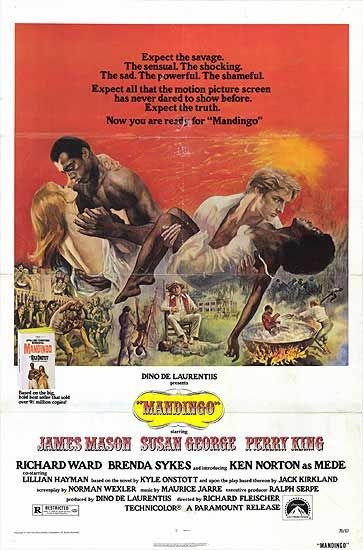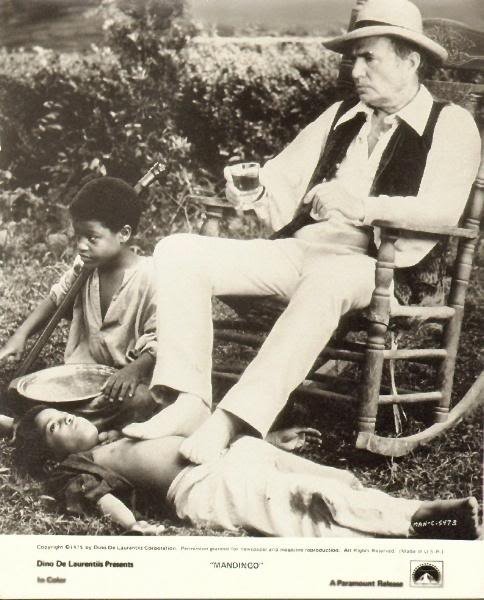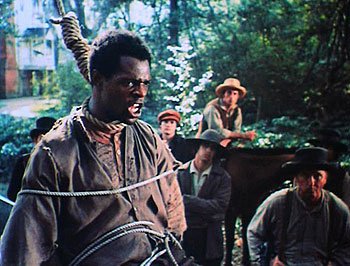MANDINGO: Speaking Schlock With A Forked Tongue
Like many a schlock fan my age, Your Humble Reviewer was first introduced to Mandingo via a throwaway gag in Kentucky Fried Movie (the faux-trailer for Catholic High School Girls In Trouble, which the narrator claims is "More offensive than Mandingo!"). A quick lookup in Leonard Maltin's T.V. Movies guide revealed that it had a "BOMB" rating and had been given a scathing writeup that ended with the dramatic exclamation "Stinko!"Thus, it was easy to believe that Mandingo was just another well-funded Hollywood potboiler from the 1970's, albeit one with racism and interracial sex thrown in for exotic spice. That is the reputation it has always had and is the reputation it continues to have in many quarters. And it's a shame because this film deserves better. Mandingo might have its roots in lurid mass-market pulp fiction but it is a well-made, serious film with a deeply felt message about societal hypocrisy. Mandingo draws its plot from Kyle Onstott's infamous novel about life at Falconhurst, a southern slave-breeding plantation. Warren Maxwell (James Mason) is its aging owner, who is trying to ensure his business and family will continue on. His son, Hammond (Perry King), does his best to help his father by finding him a prize slave from the Mandingo tribe named Mede (boxer Ken Norton) to use as a stud and also by entering into an arranged marriage with his cousin, Blanche (Susan George). However, personal passions complicate things when Hammond becomes emotionally attached to his "bed wench" slave Ellen (Brenda Sykes) and a jealous Blanche turns her eyes to Mede as she contemplates her own frustrated desires.It's a perfect setup for lurid pulp thrills and Mandingo never shies away from the graphic nature of its content: there is interracial sex, full-frontal nudity from both men and women, the depiction of viciously racist attitudes and a ton of bloody violence that includes whippings, hangings, shootings and an intensely brutal bare-knuckle fight. That said, Mandingo the film never seems to revel in its content the way Mandingo the novel does: the pileup of lurid content is more unnerving than it is exciting.The film achieves this off-kilter feel because director Richard Fleischer presents these elements in a straight-forward, unadorned style that forces the viewer to contemplate their reactions to what they are witnessing without directly telling them how to feel. Racism is presented in a matter-of-fact way and, once the shock wears off, the casual presentation allows the viewer to see how it corrodes its practitioners from within while stifling the lives of its victims. This approach allows Mandingo to communicate the ugliness of racism without reducing the film to a lecture.
Mandingo draws its plot from Kyle Onstott's infamous novel about life at Falconhurst, a southern slave-breeding plantation. Warren Maxwell (James Mason) is its aging owner, who is trying to ensure his business and family will continue on. His son, Hammond (Perry King), does his best to help his father by finding him a prize slave from the Mandingo tribe named Mede (boxer Ken Norton) to use as a stud and also by entering into an arranged marriage with his cousin, Blanche (Susan George). However, personal passions complicate things when Hammond becomes emotionally attached to his "bed wench" slave Ellen (Brenda Sykes) and a jealous Blanche turns her eyes to Mede as she contemplates her own frustrated desires.It's a perfect setup for lurid pulp thrills and Mandingo never shies away from the graphic nature of its content: there is interracial sex, full-frontal nudity from both men and women, the depiction of viciously racist attitudes and a ton of bloody violence that includes whippings, hangings, shootings and an intensely brutal bare-knuckle fight. That said, Mandingo the film never seems to revel in its content the way Mandingo the novel does: the pileup of lurid content is more unnerving than it is exciting.The film achieves this off-kilter feel because director Richard Fleischer presents these elements in a straight-forward, unadorned style that forces the viewer to contemplate their reactions to what they are witnessing without directly telling them how to feel. Racism is presented in a matter-of-fact way and, once the shock wears off, the casual presentation allows the viewer to see how it corrodes its practitioners from within while stifling the lives of its victims. This approach allows Mandingo to communicate the ugliness of racism without reducing the film to a lecture. Mandingo also gives visual cues about its thematic content in a very stylized way. With the help of Richard Kline's moody, artful cinematography, Fleischer subtly reinforces the ugliness of the time by allowing the audience to see the ugliness beneath the slave owners' attempts at appearing civilized. The Hammonds' world looks aging and decayed, an effective representation of their lifestyle's corrupting effects.Racism isn't the film's only theme: screenwriter Norman Wexler specialized in writing films about characters struggling with the stifling attitudes of the world they lived in - films like Joe, Serpico and Saturday Night Fever - and he works that theme in here to oft-devastating effect. Hammond's potential for kindness is snuffed out by his father's domination of his life, Blanche's desire to love is twisted into resentful cruelty because of Hammond's sexist treatment and the slave characters either become enraged or numb themselves over their status as non-humans.
Mandingo also gives visual cues about its thematic content in a very stylized way. With the help of Richard Kline's moody, artful cinematography, Fleischer subtly reinforces the ugliness of the time by allowing the audience to see the ugliness beneath the slave owners' attempts at appearing civilized. The Hammonds' world looks aging and decayed, an effective representation of their lifestyle's corrupting effects.Racism isn't the film's only theme: screenwriter Norman Wexler specialized in writing films about characters struggling with the stifling attitudes of the world they lived in - films like Joe, Serpico and Saturday Night Fever - and he works that theme in here to oft-devastating effect. Hammond's potential for kindness is snuffed out by his father's domination of his life, Blanche's desire to love is twisted into resentful cruelty because of Hammond's sexist treatment and the slave characters either become enraged or numb themselves over their status as non-humans. Finally, and most importantly, the performances drive the film's complex themes home. King gives Hammond the emotional depth needed to achieve the mixture of sympathy and revulsion he ultimately inspires. George's work is often written off as histrionic but it suits her character perfectly, externalizing the intensity of her bottled-up passion and anger. As expected, Mason is an old pro, making Warren an oddly likeable symbol of well-meaning corruption. Equally noteworthy are Brenda Sykes, who delivers a moving monologue about how she wants her unborn child to be free, and Ji-Tu Cumbuka's fiery turn as a rebellious slave who pays for his free spirit. Even the oft-criticized Norton does well, communicating his character's fearful inertia in a raw but affecting way.In short, Mandingo is every bit as shocking as its reputation suggests - but it's also far more intelligent and artful than you'd expect. It might speak the language of schlock but it uses it a pointed and devastating effect.
Finally, and most importantly, the performances drive the film's complex themes home. King gives Hammond the emotional depth needed to achieve the mixture of sympathy and revulsion he ultimately inspires. George's work is often written off as histrionic but it suits her character perfectly, externalizing the intensity of her bottled-up passion and anger. As expected, Mason is an old pro, making Warren an oddly likeable symbol of well-meaning corruption. Equally noteworthy are Brenda Sykes, who delivers a moving monologue about how she wants her unborn child to be free, and Ji-Tu Cumbuka's fiery turn as a rebellious slave who pays for his free spirit. Even the oft-criticized Norton does well, communicating his character's fearful inertia in a raw but affecting way.In short, Mandingo is every bit as shocking as its reputation suggests - but it's also far more intelligent and artful than you'd expect. It might speak the language of schlock but it uses it a pointed and devastating effect.


